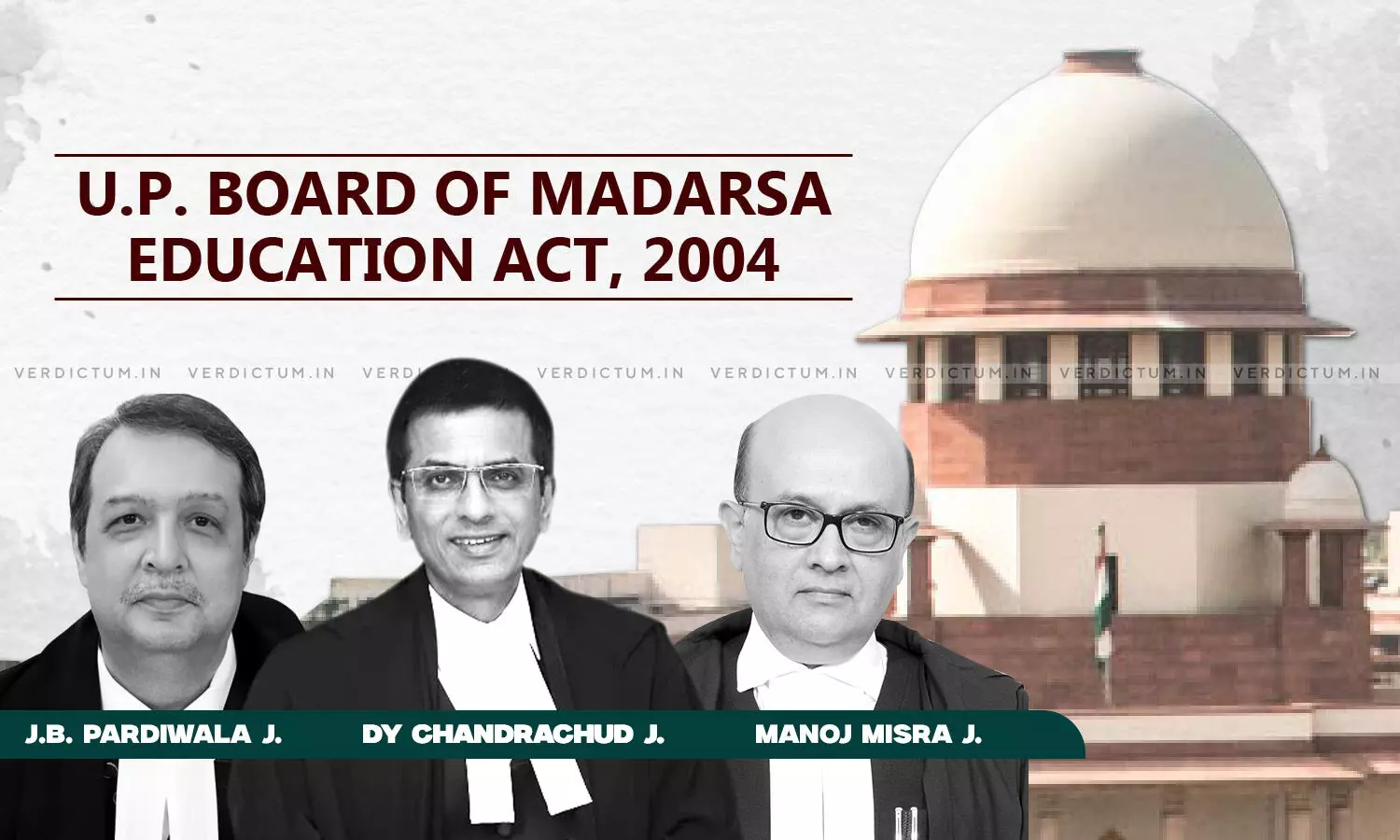
Breaking| "Well Within The Legislative Competence Of State Legislature": Apex Court Upholds Constitutional Validity Of U.P. Board Of Madarsa Education Act
 |
|The Supreme Court today upheld the constitutional validity of the 'UP Board of Madarsa Education Act 2004' and set aside the Allahabad High Court judgment that ruled that the Act is 'unconstitutional'.
The Bench of Chief Justice DY Chandrachud, Justice JB Pardiwala, and Justice Manoj Misra observed that the High Court erred in holding that the statute is bound to be struck down if it violates the secularism.
At the outset, the CJI said, "I will read out the important parts of the judgment. We have upheld the constitutional validity, except to a small extent, which I will clarify later."
The Court stated, "The state can regulate the standards of the education; the regulations relating to the quality of the education do not interfere with the administration of the Madarsas...the Act does not directly interfere with the day-to-day administration of the Madrasas; it is consistent with the positive obligation of the state to ensure that the children get adequate education."
The Bench further held that the board and state government have sufficient powers to prescribe the standard of the education. It said, "Act to the extent it seeks to grant degrees under fazil and kamil is beyond the state's power and in contravention to provisions of the UGC Act."
On examination of the Act, the Court held that the Act is only unconstitutional to the extent that it granted degrees under fazil and kamil.
In view of the above, the Court observed:
a) The Madarsa Act regulates the standard of education in madarsas recognized by the Board imparting Madarsa education.
b) The Madarsa Act is consistent with positive obligation of State to ensure that students studying in recognized madarsas attain a level of competency which will allow them to effectively participate in the society and living.
c) Article 21A and RTE Act have to be read consistently with the Right of religious and linguistic minorities to establish and administer educational institution of their choice. The board with the approval of the state government can enact regulations to ensure that religious minority institutions impart secular education of a requisite standard without destroying the minority character.
d) The Madarsa Act is within the legislative competence of the State legislature and tracable to Entry 25 of List III. However, the provisions of the Act which seek to regulate higher educational degrees which is Fazil and Kamil are unconstitutional as they are in conflict with the UGC Act.
Accordingly, the Court set aside the Allahabad High Court judgment.
It is to be noted that NCPCR, in its written submissions, stated that the 2004 Act, instead of an enabling tool, becomes a depriving tool for the children studying in minority institutions. In addition, such institutes are also providing Islamic Religious Education to Non-Muslims, which is further in violation of Article 28 (3) of the Constitution of India.
In a related news, the NCPCR in a letter dated October 11, released a report titled "Guardians of Faith or Oppressors of Rights: Constitutional Rights of Children vs. Madrasas," highlighting concerns about the impact of madrasas on children's education. The said report has been forwarded to the Chief Sectaries and Administrators of all States and Union Territories by the Chairperson of the Commission Priyank Kanoongo. The report emphasizes that while religious institutions are protected under Articles 29 and 30 of the Indian Constitution, their exemption from the Right to Education (RTE) Act, 2009, has led to the deprivation of formal education for children attending madrasas.
The Court in its August 5 Order had ordered, "As regards the question of interim relief, (1) the High Court concludes that the 2004 Act violates the principle of secularism which underlie the basic structure of the Constitution and offends Articles 14, 19, 21, 21A; and (2) the object and purpose of the 2004 Act is to provide for the establishment of a board for madrasa education in State. The definition of the expression Madarsa Education is contained in U/s 2(h) of the Statute means education in Urdu, Arabic, Islamic studies, philosophy, and such other branches specified by board."
The Bench had said that while striking down the Madarsa Act of 2004, the High Court, prima facie, has misconstrued the provisions of the Act. "The Act per se does not provide for a religious instruction in an educational institution maintained out of State funds. The object and purpose of the statutory provisions is regulatory in character," the Court had said. Consequently, the Court had stayed the relocation of 17 lakh students and 10,000 Madarsa teachers to regular schools in State of UP.
Earlier, on March 22, the Allahabad High Court had declared the U.P. Board of Madarsa Education Act, 2004 unconstitutional, holding that the State has no power to create a Board for religious education or to establish a Board for school education only for a particular religion and philosophy associated with it.
The Court had observed that the very object and purpose of the U.P. Board of Madarsa Education Act (Madarsa Act) was violative of the principles of secularism and, thus, violative of the Constitution of India. Accordingly, “any such action on part of State violates the principles of secularism, which is in the letter and spirit of the Constitution of India. The same also violates Article 14 of the Constitution of India, which provides for equal treatment to every person by the State,” the Court had held.
Cause Title: Anjum Kadari and Anr. v. Union of India and Ors. [SLP(C) No. 8541/2024; Diary No. 14432/2024]